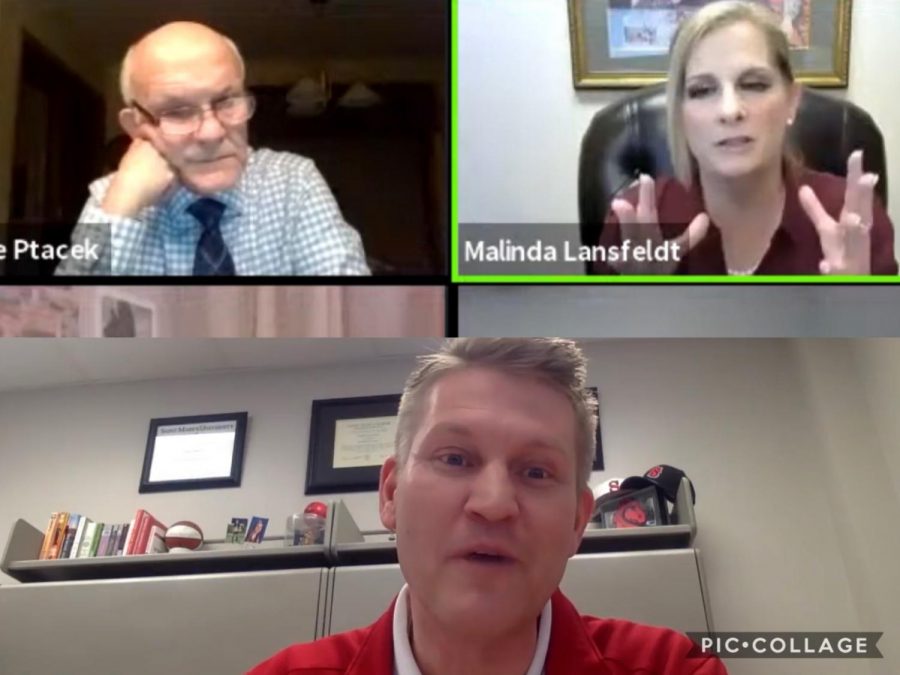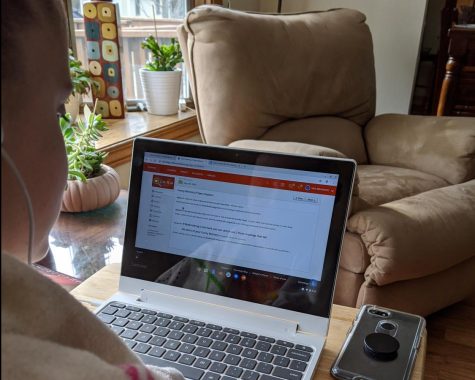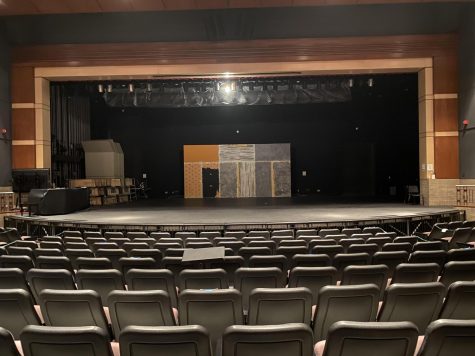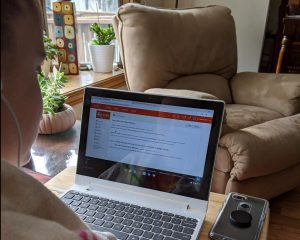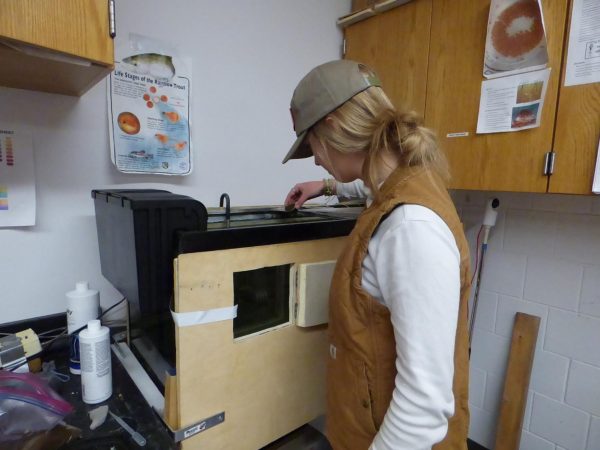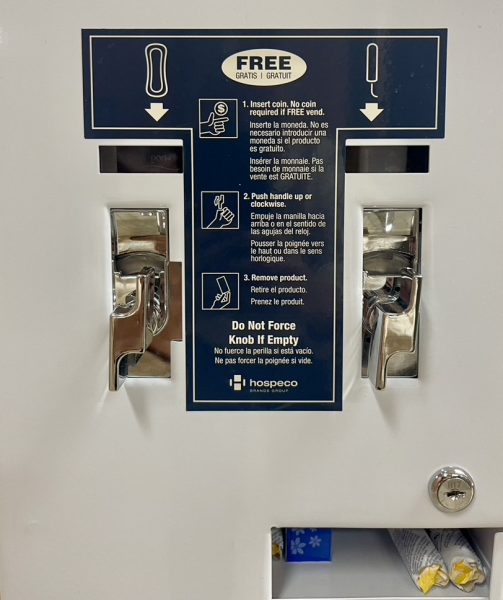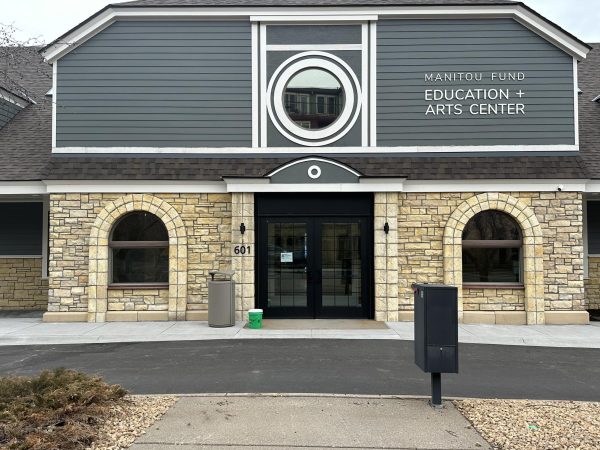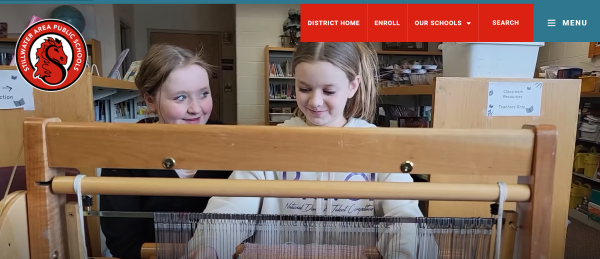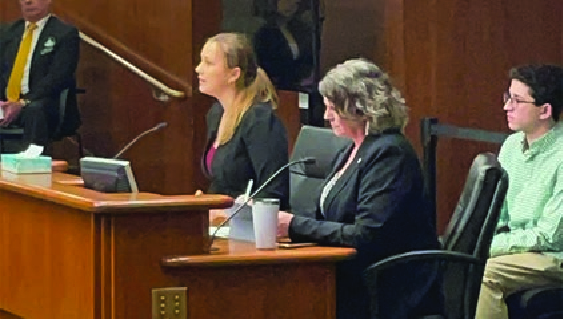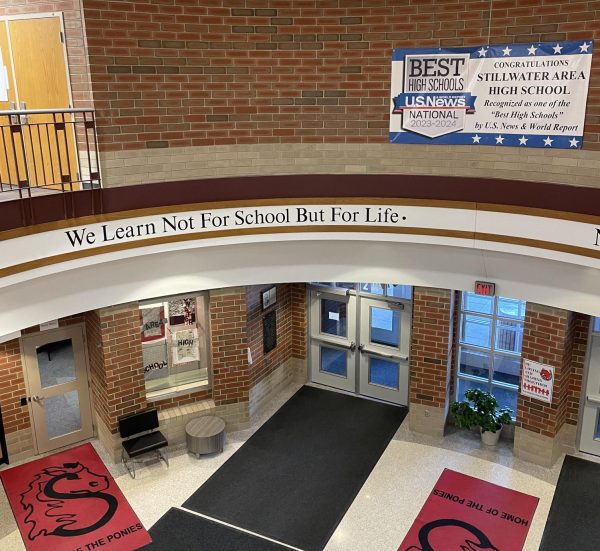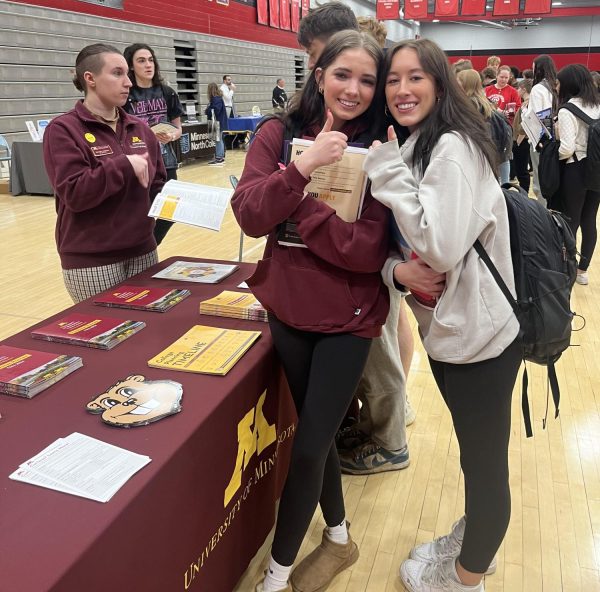Leadership in a time of pandemic
Top: With board-member Mike Ptacek on the left, Super-Intendant Malinda Landsfelt speaks at the November 19 School Board Meeting. Bottom: Principal Rob Bach gives a video update last spring to students before jumping into distance learning.
December 1, 2020
“Depending on what’s going on with school board meetings and decisions being made, sometimes I’ll get 100 to 300 plus emails [a day] from families and community members and staff,” Interim-Superintendent Malinda Lansfeldt said.
“I don’t mean to dodge [the question] or to be evasive,” Principal Rob Bach added. “But there’s not really much of a typical day.”
Because of the COVID-19 pandemic, governors, superintendents and principals have been tasked with making some of the most important decisions of their careers. They also know their decisions will not mark just their careers, but also students’ most important milestones. Their first year of kindergarten. The transition to middle school. Their first year of high school. Their graduation.
“It’s hard because you’re making choices that affect people’s lives and livelihoods. And it’s very rare that you can make a decision that doesn’t have some kind of negative impact on somebody within your organization,” Bach said. “The bottom line is, I know that when I retire or die or whatever, and I’m looking back on my life or my career, this will be one of the things that I’m proudest of just in terms of how we’ve been able to respond to this.”
Leaders of all types have to respond to circumstances beyond their control. Often, however, they have already had much experience leading with all the necessary tools in their bag.
Lansfeldt, before becoming the Interim Superintendent, first got her footing as an Assistant Principal in Utah, where she served “probably around 80,000 students, where we had a little over 8,000 students in our elementary schools.” There were some intermediate steps in between her position now, but none were as formative as that position.
Bach has spent his early career as an Assistant Principal at Park High School, Woodbury High School, and for the past 7 years as a Principal at SAHS.
As recently as Nov. 19, Lansfeldt spoke to the school board about urging for schools, at all levels, to turn entirely towards distance learning because of a lack of staffing for the elementary schools in the 1,100 plus employee district.
“Because when you don’t have office staff, when you don’t have enough custodians, when you don’t have enough subs, it’s just not safe to run a school,” Lansfeldt said. “We had the Assistant Principal Matt Kraft [shift] to the elementary to schools to help with staff.”
Both Bach and Lansfeldt stressed their need for support from colleagues and communication to be effective leaders.
“I think you need to listen to people. I think you need to genuinely, listen to people,” Lansfeldt said. “People don’t come to you unless they’re concerned about they are bothered about. Or they have great ideas, something that they’re passionate about.”
“You got to have good people around you,” Bach said. “It’s like playing cards and you’re kind of dealt a losing hand, you know. You got to make the best out of the hand that you’ve been dealt, and in order for me to do that in this job, that requires a bunch of other people.”
The bottom line is, I know that when I retire or die or whatever, and I’m looking back on my life or my career, this will be one of the things that I’m proudest of.
— Rob Bach
Students, as well as Bach’s colleagues, have helped him deliver on the promise of a safe school.
“When we started this school year, no one knew what hybrid learning was going to look like. I didn’t know whether kids were to obey one way traffic signals or not. And yet, within one day, kids just did it,” Bach explained.
Bach prided him and the students on not being one “of these schools that are on the news.”
Even while both leaders, objectively, have done a very good job in their roles, they still have their reservations.
“One of the things that’s been really, really, hard, is just the whole concept of the unknown,” Bach said. “The idea that information is changing on you. We’re a really big organization, obviously, we’ve got a lot of people and a lot of instruction, built up into what we do.”
“It’s an entire team effort, there’s always things that you always want to try and do better,” Lansfeldt added. “You always want to try and learn.”
While leading and managing large organizations during a pandemic can certainly make pessimism ripe, both Bach and Lansfeldt see silver linings in all of this.
“This pandemic has caused teachers to change quickly and learn new tech skills, learn new student engagement skills, they have an entirely new toolbox to use and it has been heavy, heavy, lifting by teachers and all of our staff to get this figured out, but it has forced people to learn a lot of new things,” Lansfeldt explained.
“You have to find silver linings in just about everything,” Bach added. “I feel like this has been a challenge, completely unforeseen. But as a building, as a staff, and as a student body and a parent community, we’ve risen up to meet the challenge and that’s just really, really, cool to be a part of. We’ll look back on this someday and be really proud of our efforts.”


